Madlener House
4 West Burton Place
Chicago, Illinois 60610
Telephone: 312.787.4071
[email protected]
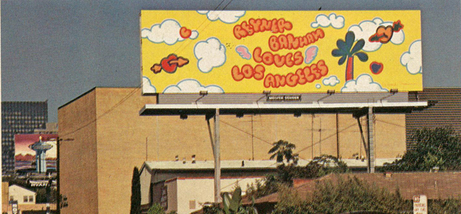
Reyner Banham Loves Los Angeles (1972) is a 50-minute film devoted to exploring the British architectural historian’s love affair with this uniquely American city. Banham roams the “four ecologies” of Los Angeles—beach, freeways, foothills, and basin—first presented in his 1971 book, with the playful assistance of “Baede-Kar” (an 8-track audio tour that parodies the 19th century German guidebooks published by Karl Baedeker). Along the way, he tours the Watts Towers, riffs on Googie architecture with artist Ed Ruscha, visits the unusual characters of Venice Beach, and meanders the highways with a giddy enthusiasm that knowingly celebrates the city’s sprawl and indecipherability, the very qualities derided by conventional critics of architecture and urbanism. The combination of Banham’s passion for history and pop culture and the film’s period footage, music, and cameos with local personalities makes for an entertaining and insightful tour through 1970s Los Angeles.
This film is presented in conjunction with the Graham-funded exhibition The City Lost and Found: Capturing New York, Chicago and Los Angeles, 1960-1980 on view at Art Institute of Chicago through January 11 and opening at the Princeton University Art Museum February 21. The screening will include introductory remarks by exhibition curators Alison Fisher and Greg Foster-Rice.
Alison Fisher is Harold and Margot Schiff Assistant Curator of Architecture and Design at the Art Institute of Chicago. With a focus on heterodox histories of modern architecture and urbanism, she has curated numerous exhibitions including the retrospective Bertrand Goldberg: Architecture of Invention (2011-12). She is the co-curator of The City Lost and Found: Capturing New York, Chicago and Los Angeles, 1960-1980.
Greg Foster-Rice is an Associate Professor at Columbia College Chicago, where he teaches the history, theory and criticism of photography. He has published extensively on the relationship of photographic media to the built environment, including co-editing and co-authoring the anthology Reframing the New Topographics (2011). He is the co-curator of The City Lost and Found: Capturing New York, Chicago and Los Angeles, 1960-1980.
Image: "Reyner Banham Loves Los Angeles," 1972.
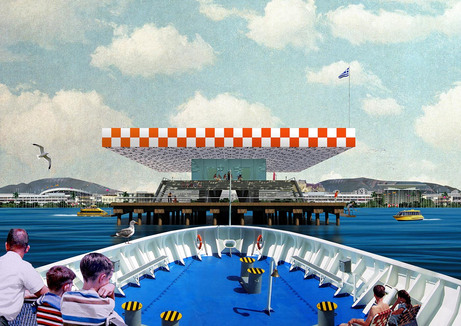
Please join us for a reception to celebrate the opening of our winter exhibition, "Treatise: Why Write Alone?," organized by Jimenez Lai.
6PM - Comments by Jimenez Lai, CAMES/gibson, Design with Company, is-office, Andrew Kovacs, Alex Maymind, Norman Kelley, and SPEEDISM.
This exhibition features the work of:
Bittertang (Michael Loverich & Antonio Torres), New York; Bureau Spectacular (Jimenez Lai), Chicago & Los Angeles; CAMES/gibson (Grant Gibson), Chicago; Design With Company (Stewart Hicks & Allison Newmeyer), Chicago; Fake Industries Architectural Agonism (Urtzi Grau & Cristina Goberna), New York; First Office (Andrew Atwood & Anna Neimark), Los Angeles; is-office (Kyle Reynolds & Jeff Mikolajewski), Chicago; Andrew Kovacs, Los Angeles; Alex Maymind, Los Angeles; Norman Kelley (Thomas Kelley & Carrie Norman), Chicago and New York; Point Supreme (Konstantinos Pantazis & Marianna Rentzou), Athens, Greece; Softlab (Mike Szivos), New York; SPEEDISM (Pieterjan Ginckels), Brussels, Belgium; and Young & Ayata (Michael Young & Kutan Ayata), New York.
PARTICIPANT BIOS
Bittertang is a New York City-based design farm founded by Michael Loverich and Antonio Torres. Bittertang has built three inflatable pavilions, a pregnant sugar-oozing piñata, a plush toy collection, a sagging birdcage, and edible environments. They have won numerous awards, including the 2010 Architectural League Prize and the 2014 AIA New Practices New York award. Michael Loverich received his MArch from the University of California, Los Angeles. He lives in Manhattan and currently teaches at the University of Pennsylvania. Antonio Torres graduated from the University of California, Los Angeles with an MArch before moving to New York to work for Neil Denari. He lives in Guadalajara and Manhattan and teaches in Mexico at ITESO and CCAU.
Jimenez Lai is the founder and leader of the design firm Bureau Spectacular. He holds an MArch from the University of Toronto. In the past several years, Lai has built numerous installations and has exhibited his work and published widely. Lai’s first manifesto, entitled Citizens of No Place,was published by Princeton Architectural Press in 2012 with a grant from the Graham Foundation. Lai is the recipient of numerous awards, including the Architectural League Prize for Young Architects (2012) and the inaugural Millennium BCP Lisbon Triennale Début Award (2013), among others. In 2014, he was the curator and designer of the Taiwan Pavilion at the 14th Venice Architectural Biennale. Lai currently teaches in the Department of Architecture and Urban Design at the University of California, Los Angeles.
Grant Gibson is a Chicago-based educator, registered architect, and founding principal of CAMES/gibson, Inc.—an architecture and design practice committed to creating environments and objects that are cross-pollinated with common social, political, economic interests and individual experiences and desires. Gibson received his MArch from the University of Illinois at Chicago, and holds degrees from Purdue University in Architectural Engineering and Construction Engineering Technology. He is currently clinical assistant professor at the University of Illinois at Chicago.
Design With Company (Dw/Co) is the Chicago-based architectural collaborative of Stewart Hicks and Allison Newmeyer. Dw/Co seeks to transform the world through textual and visual narratives, speculative urban scenarios, installations, and small-scale interactive constructions. Stewart Hicks received his MArch from Princeton University and is currently assistant professor of architecture at the University of Illinois at Chicago. He is a fellow of the MacDowell Artist Colony and a recipient of Architectural Record's Design Vanguard Award and the Young Architect's Forum Prize. Alison Newmeyer is visiting assistant professor at the University of Illinois at Chicago and also teaches at the University of Wisconsin–Milwaukee and the Illinois Institute of Technology. She is a fellow of the MacDowell Artist Colony and is the recipient of architectural awards from the Van Alen Institute and Architizer.
Founded by Cristina Goberna and Urtzi Grau, Fake Industries Architectural Agonism (FKAA) is an entity of variable boundaries and questionable taste that provides architectural tools to mediate between citizens and institutions, the public sphere, and disciplinary knowledge. Recent projects include a new National Velodrome for the City of Medellin, Colombia, the Superphosphates! master plan for the mining village of Aldea Moret, Spain, and the OE House in Barcelona. In 2014, FKAA won the AIA New York New Practices prize, and was shortlisted for the MoMA PS1 Young Architects Program, the Art-Basel-Miami Design pavilion, and most recently, the Guggenheim Helsinki Design Competition.
First Office is a Los Angeles-based architecture and design collaborative founded by Andrew Atwood & Anna Neimark. Built projects include a collaboration on the Pinterest Office Headquarters in San Francisco, a Dome stage in Afghanistan, a temporary Screening Room at the MAK Center for Art in Architecture in Los Angeles, and a rehabilitation of a Shotgun House in Lexington, Kentucky. Their work has been exhibited in the U.S. and abroad, including the Beijing Biennale, the Pacific Design Center, the Storefront for Art and Architecture, and an upcoming show at the MAK Center, Los Angeles, among others. Andrew Atwood graduated from Harvard’s Graduate School of Design, and is currently assistant professor of architecture at the University of California, Berkeley. Anna Neimark received a BA in architecture from Princeton University and an MArch from Harvard’s Graduate School of Design. She is currently a full-time faculty member at the Southern California Institute of Architecture.
Pieterjan Ginckels is a Belgian artist and architect whose work concerns itself with the acceleration of modern life, which he explores through exhibitions and experiences that interweave spatial, artistic, and design practice, and everything in between. He studied architecture at K.U.Leuven, WENK Sint-Lucas Brussels, and Universität Stuttgart, and currently teaches at KU Leuven Faculty of Architecture, Brussels. In 2008, Ginckels co-founded with German artist and architect Julian Friedauer, SPEEDISM, which proposes anti-methods for an increasingly theme-based, spectacular, and accelerated society.
is-office is a Chicago-based design firm specializing in objects, interiors, and buildings. Founded by Kyle Reynolds and Jeff Mikolajewski, the firm leverages the unique agency of physical form to engage issues of culture, urbanism, lifestyle, and iconography indigenous to the modern metropolis. Kyle Reynolds is an assistant professor at the University of Wisconsin Milwaukee School of Architecture and Urban Planning. He received an MArch from Princeton University and a BS in architecture with a certificate of urban planning from the University of Wisconsin at Milwaukee. His work and writing have been published in On Farming: Bracket 1, The SANAA Studios 2006-2008, and Pidgin Magazine, among others. Jeff Mikolajewski is a Project Designer at Johnston Marklee in Los Angeles. Previously he has lived in Shanghai, Milan, Copenhagen, and Chicago while working for such firms as Bjarke Ingels Group, Andrew Zago Architect, UrbanLab, and Gensler. He received an MArch from the University of Illinois at Chicago and a BS in architecture from the University of Wisconsin at Milwaukee.
Andrew Kovacs is a Los Angeles-based designer. He has exhibited at the Storefront for Art and Architecture, the Architecture and Design Museum, Los Angeles, and the Jai & Jai Gallery, Los Angeles. His work on architecture and urbanism has been published in Pidgin, Project, Clog, Domus, and Fulcrum, among others. Kovacs studied architecture at Syracuse University (BArch), The Architecture Association in London, and Princeton University (MArch). He is currently a visiting assistant professor in architecture & urban design at the University of California, Los Angeles.
Alex Maymind is a Los Angeles-based designer and teacher. He holds an MArch from Yale University where he was awarded the Taylor History & Theory Memorial Prize, and graduated cum laude in architecture from The Ohio State University’s Knowlton School of Architecture. He was the 2012-13 Walter B. Sanders Fellow at the University of Michigan where his research resulted in the exhibition 100 Drawings. His writing, ranging from a genealogy of the free section to an exploration of globalization’s clichés, have appeared in a number of journals including Log, Pidgin, Thresholds, OFFRAMP, and Clog. He is currently pursuing a PhD in history and theory of architecture at the University of California, Los Angeles.
Norman Kelley is the architecture and design collaborative of Carrie Norman and Thomas Kelley based in New York and Chicago. The firm’s work has been published and exhibited widely, most recently in Log 31: New Ancients and the 14th Venice Architecture Biennale. They are the recipients of the 2014 Architecture League of NY Young Architect’s Prize, and their design work is currently represented by Volume Gallery in Chicago. Thomas Kelley received an MArch from Princeton University and a BArch from the University of Virginia. He is the recipient of the Peter Reyner Banham Fellowship from SUNY Buffalo and the Rome Prize in Architecture from the American Academy in Rome. Kelley is currently a clinical assistant professor in the School of Architecture at the University of Illinois at Chicago. Carrie Norman received an MArch from Princeton University and a BArch from the University of Virginia. Norman is a licensed architect and a member of the Architecture League of NY Young Architects & Designers Committee. She is currently a Senior Design Associate with SHoP Architects in New York.
Athens-based Point Supreme was founded by Konstantinos Pantazis and Marianna Rentzou in 2008 after they studied and worked in London, Rotterdam, Eindhoven, Brussels, and Tokyo. At the heart of their practice are research and self-initiated proposals for the improvement of Athens. A selection of Athens Projects was exhibited in the Greek Pavilion of the 13th Venice Architecture Biennale in 2012. The office has won numerous awards including first prize in EUROPAN 10 for a social housing and master plan in Trondheim; a 2012 competition for the Athens waterfront; and the 2014 Urban Shade competition in Tel Aviv. They are currently nominated for the 2014 Iakov Chernikhov International Prize for Young Architects.
SOFTlab is a design studio based in New York City that operates at the intersection of architecture, art, video, and interactive media design. In 2012 SOFTlab was awarded the Architectural League Prize for Young Architects & Designers, and previously in 2010 the studio was selected for the New Practices New York award by the AIA New York Chapter. Michael Szivos created SOFTlab shortly after earning his graduate degree in architecture from Columbia University’s Graduate School of Architecture, Planning and Preservation. Szivos teaches at Yale University and is an assistant professor in the School of Architecture at the Pratt Institute.
Founded in 2008, Young & Ayata is a New York-based architectural design studio founded by Michael Young and Kutan Ayata. Young & Ayata view the tensions, overlaps, and frictions created through multiple mediations as the conditions for an aesthetic of estranged realism in architecture. Michael Young earned an MArch II from Princeton University and a BArch from Cal Poly San Luis Obispo. He is a registered architect in the State of New York, and is an assistant professor at The Cooper Union and visiting lecturer at Princeton University. Kutan Ayata received a BFA in architecture from Massachusetts College of Art in Boston and an MArch from Princeton University. He is a registered architect in the Chamber of Architects in Turkey, and is currently a lecturer at the University of Pennsylvania and adjunct assistant professor at Pratt Institute GAUD.
Image: Point Supreme (Konstantinos Pantazis & Marianna Rentzou), "Faliro Pier," 2012. Courtesy the artist.
For more information on the exhibition, Treatise: Why Write Alone?, click here.

On January 28, Belgian artist and designer Pieterjan Ginckels of the collaborative SPEEDISM will discuss "TWO-FACED MF EASY RIDE," a new work currently on view in the Graham Foundation's exhibition, Treatise: Why Write Alone?
“TWO-FACED MF EASY RIDE” is a cruise through an architect's rendered theme park. Hyper-layered and immersive, SPEEDISM’s new dual channel video installation with sound and fog presents a possible anti-design method, revealing how embracing speed and the superficial as a condition might help construct alternative methods, tools, and modes of (re)production.
Pieterjan Ginckels is a Belgian artist and architect whose work concerns itself with the acceleration of modern life, which he explores through exhibitions and experiences that interweave spatial, artistic, and design practice, and everything in between. He studied architecture at K.U.Leuven, WENK Sint-Lucas Brussels, and Universität Stuttgart, and currently teaches at the KU Leuven Faculty of Architecture, Brussels. In 2008, Ginckels co-founded with German artist and architect Julian Friedauer, SPEEDISM, which proposes anti-methods for an increasingly theme-based, spectacular, and accelerated society.
"TWO-FACED MF EASY RIDE" is produced by Pieterjan Ginckels, Aster De Valck and Hantrax.
For more information on the exhibition, Treatise: Why Write Alone?, click here.
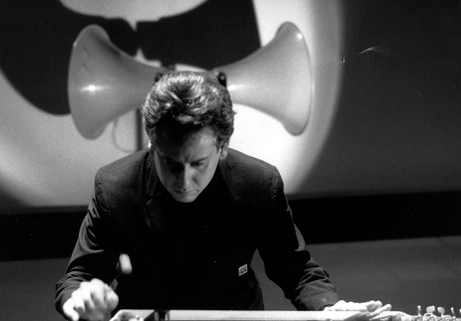
On Saturday, February 7, American media artist and sound composer Arnold Dreyblatt will perform two works: "Turntable History / Spin Ensemble" (2011), a multi-channel sound composition created from Dreyblatt's own recordings of a Magnetic Resonance Imaging Scanner, which he treated as a giant Tesla coil, and "Nodal Excitation," a 1979 work for amplified “excited strings'” bass, strung with piano wire.
Arnold Dreyblatt is a composer, performer, and visual artist. He studied music with Pauline Oliveros, La Monte Young, and Alvin Lucier, and has been based in Berlin, Germany since 1984. Among the second generation of New York minimal composers, Dreyblatt developed a unique approach to composition and music performance. As he began his music career in the late 1970s in New York, he invented a set of new and original instruments and performance techniques, as well as a just intonation tuning system. He has formed and led numerous ensembles, working under the name “The Orchestra of Excited Strings.” In 2007, he was elected to the German Academy of Art (Akademie der Künste, Berlin).
This performance is presented in partnership with Lampo. Founded in 1997, Lampo is a non-profit organization for experimental music and intermedia projects. Visit www.lampo.org. The Graham Foundation and LAMPO are grateful to the School of the Art Institute of Chicago, Department of Sound and Department of Visual Critical Studies for their support of this performance.
PLEASE NOTE: RSVP is required, and event entry is on a first-come, first-serve basis. RSVP does not guarantee entry, so please plan to arrive early. Doors will open at 7:30PM.
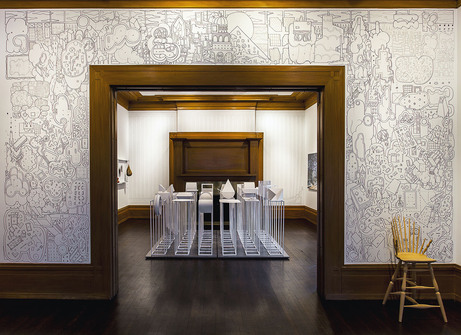
Please join us for presentations by Chicago-based designer Kyle Reynolds of is-office and Thomas Kelley and Carrie Norman, co-founders of the Chicago and New York-based architecture collaborative Norman Kelley, whose works are featured in “Treatise: Why Write Alone?”—the Graham Foundation’s current exhibition and publication project that brings together fourteen young conceptual design offices to explore the architectural treatise as a platform for debate. Reynolds, Kelley, and Norman will discuss their design practices and recent projects, which include is-office's speculations about urban forms and conditions using generative Photoshopping and the subverting of Google to Norman Kelley's "Wrong" chairs and site-specific drawings which re-examine architecture’s relationship to vision through deceptive optics.
is-office is a Chicago-based design firm specializing in objects, interiors, and buildings. Founded by Kyle Reynolds and Jeff Mikolajewski, the firm leverages the unique agency of physical form to engage issues of culture, urbanism, lifestyle, and iconography indigenous to the modern metropolis. Kyle Reynolds is an assistant professor at the University of Wisconsin–Milwaukee’s School of Architecture and Urban Planning. He received an MArch from Princeton University and a BS in architecture with a certificate in urban planning from the University of Wisconsin–Milwaukee. His work and writing have been published in On Farming: Bracket 1, The SANAA Studios 2006–2008, and Pidgin Magazine, among others. Jeff Mikolajewski is a project designer at Johnston Marklee in Los Angeles. He has lived previously in Shanghai, Milan, Copenhagen, and Chicago, all while working for firms such as Bjarke Ingels Group, Andrew Zago Architect, UrbanLab, and Gensler. He received his MArch from the University of Illinois at Chicago and he holds a BS in architecture from the University of Wisconsin–Milwaukee.
Norman Kelley is the architecture and design collaborative of Carrie Norman and Thomas Kelley, based in New York and Chicago. The firm’s work has been published and exhibited widely, most recently in Log 31: New Ancients and the 14th Venice Architecture Biennale. They are the recipients of the 2014 Architecture League of New York Young Architect’s Prize, and their design work is currently represented by Volume Gallery in Chicago. Thomas Kelley received an MArch from Princeton University and a BArch from the University of Virginia. He is the recipient of the Peter Reyner Banham Fellowship from SUNY Buffalo and the Rome Prize in Architecture from the American Academy in Rome. Kelley is currently a clinical assistant professor in the School of Architecture at the University of Illinois at Chicago. Carrie Norman received an MArch from Princeton University and a BArch from the University of Virginia. Norman is a licensed architect and a member of the Architecture League of New York’s Young Architects and Designers Committee. She is currently a senior design associate with SHoP Architects in New York.
Image: View of “Treatise: Why Write Alone?”, 2015, Graham Foundation, Chicago. Photo Matthew Messner.
For more information on the exhibition, Treatise: Why Write Alone?, click here.
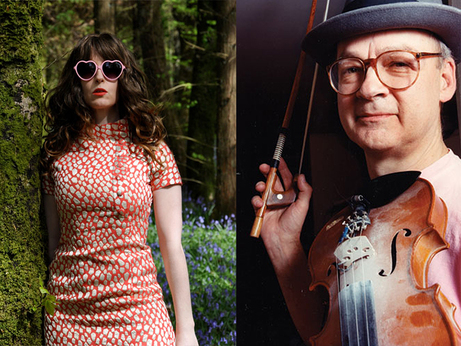
On Saturday, February 28th, Jennifer Walshe and Tony Conrad will perform together as Ma La Pert, an improvisational collaboration that blends a wide variety of traditional and non-traditional instruments such as violins, autoharps, drums, vocalizations, found objects, and costumes to generate unique sounds during their live performances.
Jennifer Walshe is a London-based vocalist, composer, and conceptual artist who often works under various identities individually as Grupat, and also with different collaborators across Europe and the US, including Ma La Pert with Tony Conrad and with Tomomi Adachi on the People’s United Telepathic Improvisational Front. Walshe’s work has been exhibited in New York, Dublin, London, and Toronto.
Tony Conrad is an experimental filmmaker, artist, composer and musician based between Brooklyn and Buffalo, NY. He is known for his early pioneering drone-based minimalist music, as well as his involvement in the Theatre of Eternal Music (The Dream Syndicate) and collaborations with numerous filmmakers, artists, and musicians such as John Cale, La Monte Young, Mike Kelley, Marian Zazeela, Jim O’Rourke, Lou Reed, and Walter De Maria. In addition to experimental filmmaking, Conrad has composed numerous audio works for amplified strings, and has more recently focused on examining traditions in Western music and geometry from Pythogoras to the present.
This performance is presented in partnership with Lampo. Founded in 1997, Lampo is a non-profit organization for experimental music and intermedia projects. Visit www.lampo.org for more information.
PLEASE NOTE: RSVP is required, and event entry is on a first-come, first-serve basis. RSVP does not guarantee entry, so please plan to arrive early. Doors will open at 7:30PM.
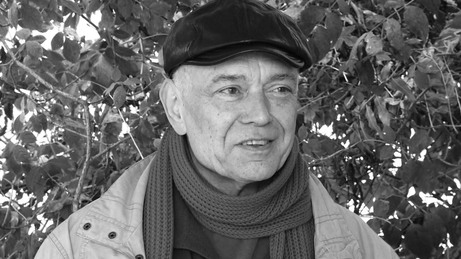
As part of a Chicago-wide festival celebrating German composer Mathias Spahlinger’s 70th year, the Graham Foundation will host a performance of three of the composer’s works. Suono Mobile will present his early fünf stücke für zwei klavier (1969) and the explosive octet aussageverweigerung/gegendarstellung (1981), and the Illinois Modern Ensemble and conductor Stephen Andrew Taylor will perform Spahlinger's large ensemble work furioso (1991), along with in nuce (2003/2009) by former Spahlinger protégé Philipp Blume.
This performance is the fourth concert in the Spahlinger festival, a 10-day residency and retrospective of his music and thought. The first of its kind in the States, this festival presents six concerts and a symposium, all free and open to the public, and brings together renowned musicians and scholars from Chicago, New York, Berlin, Zürich, and Basel.
The Illinois Modern Ensemble comprises students dedicated to the performance of contemporary and experimental music. Its repertoire in recent seasons includes works by leading figures such as Steve Reich, George Friedrich Hass, and Augusta Read Thomas, as well as a constant stream of new works by student and faculty composers.
Suono Mobile USA was established in 2012 by saxophonist Nathan Mandel and composer Philipp Blume. As part of the larger Suono Mobile initiative for new music worldwide, Suono Mobile USA is a modular collective, a sort of “think tank,” for presenting and curating modern and new musical works, programs, and art/music initiatives.
there is no repetition. Mathias Spahlinger at 70
http://norepetition.tumblr.com/
there is no repetition: complete program
http://norepetition.tumblr.com/completeprogrampdf
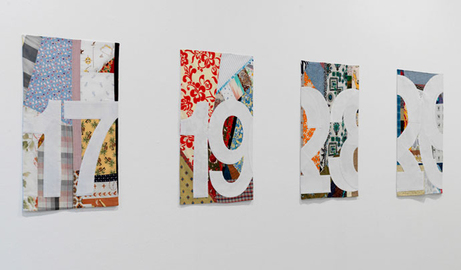
Karen Reimer, "Endless Set #17-29," 2007. Sewn fabric. 30 x 20 inches. Courtesy the artist and Monique Meloche.
The Graham Foundation Bookshop is pleased to host the launch of Endless,—the first major publication on the work of pioneer craft artist Karen Reimer. Published by Gallery 400 and WhiteWalls, the catalogue not only surveys this innovative artist’s work, but also rethinks the canonical relationship between architecture and craft.
Endless, includes important essays by leading cultural critic Lauren Berlant, architectural critic Penelope Dean, and art historian Judith Russi Kirshner, as well as an interview with the artist by Gallery 400 director Lorelei Stewart. These essays boldly theorize a new relationship of craft to labor and explore how this groundbreaking artist entwines craft, art, and contemporary issues.
Reimer will be signing copies of her new publication, which will be available for purchase in our bookshop. The event will also feature a Q&A with the artist moderated by Lorelei Stewart. Endless is supported by a Craft Research Fund grant from the Center for Craft, Creativity and Design, Inc. and by the Andy Warhol Foundation for the Visual Arts.
Karen Reimer produces work that expansively addresses the larger relationship of craft to modernist and postmodernist cultural aims. For Reimer, craft is a means to explore architectural concerns, minimalist issues, questions of labor, and connotations within the domestic or vernacular. She has had solo exhibitions at Monique Meloche Gallery, Chicago; the Rochester Art Center, MN; the Riverside Arts Center, IL; Schopf Gallery, Chicago; and the Hyde Park Art Center, Chicago. Her work has been included in group shows at the Museum of Contemporary Art, Chicago; the Contemporary Craft Museum, Portland, Oregon; and Wallspace Gallery, New York, among others. Reimer is the recipient of an Artadia Individual Artist grant and a Richard A. Driehaus Individual Artist award. Her work has been included in the publications By Hand: The Use of Craft in Contemporary Art (Princeton Architectural Press, 2010); The Object of Labor: Art, Cloth, and Cultural Production (MIT Press, 2007); and Contemporary Textiles (Black Dog Press). She is currently an instructor in Fiber and Material Studies at the School of the Art Institute of Chicago. Reimer completed a BA at Bethel College, North Newton, KS, and an MFA at the University of Chicago.
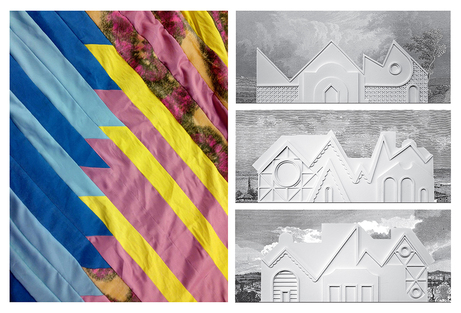
Please join us for presentations by Chicago-based designers Grant Gibson of CAMESgibson and Allison Newmeyer and Stewart Hicks, co-founders of the architecture collaborative Design With Company (Dw/Co), whose works are featured in Treatise: Why Write Alone?—the Graham Foundation’s current exhibition and publication project that brings together fourteen young conceptual design offices to explore the architectural treatise as a platform for debate. Recalling his collaboration with T. E. Cames, the influential, yet fictional partner of CAMESgibson, Gibson will discuss the emergence of the memoir as a viable design construct for the contemporary performance-oriented culture, while Newmeyer and Hicks will discuss architecture and learning from the everyday, collage fiction, corn and character.
Grant Gibson is a Chicago-based educator, registered architect, and founding principal of CAMESgibson, Inc.,an architecture and design practice committed to creating environments and objects that are cross-pollinated with common social, political, and economic interests, as well as individual experiences and desires. Gibson received his MArch from the University of Illinois at Chicago, and holds degrees from Purdue University in architectural engineering and construction engineering technology. He is currently clinical assistant professor at the University of Illinois at Chicago.
Design With Company (Dw/Co) is the Chicago-based architectural collaborative of Stewart Hicks and Allison Newmeyer. Dw/Co seeks to transform the world through textual and visual narratives, speculative urban scenarios, installations, and small-scale interactive constructions. Stewart Hicks received his MArch from Princeton University and is currently assistant professor of architecture at the University of Illinois at Chicago. He is a fellow of the MacDowell Artist Colony and a recipient ofArchitectural Record's Design Vanguard Award and the Young Architect's Forum Prize. Alison Newmeyer is visiting assistant professor at the University of Illinois at Chicago and also teaches at the University of Wisconsin–Milwaukee and the Illinois Institute of Technology. She is a fellow of the MacDowell Artist Colony and is the recipient of architectural awards from the Van Alen Institute and Architizer.
Images (left to right): CAMESgibson, Victory Column of T. E. Cames (detail), 2015. Fabric and foamcore. 204 x 14 x 14 inches. Design with Company, Midwest Culture Sampler (Department of Quantity, Scale, Image), 2015. Three archival inkjet prints. 26 x 11 1/4 inches each.
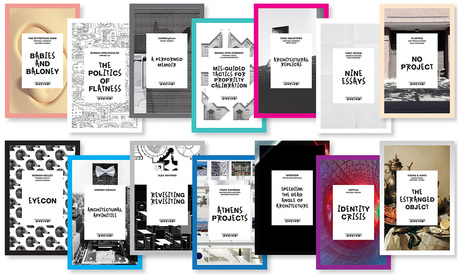
Please join us for a panel discussion and book launch to conclude our current exhibition and publication project Treatise: Why Write Alone?
On March 28th, Jimenez Lai will be joined by representatives from all fourteen offices to debate the collective and individual stakes that have emerged from this temporary allegiance of designers. All together for the first time, the participants will discuss their own work as well as the perceived outcomes of this project for the participants and within the architectural field. RSVP is required for the morning and afternoon panel sessions.
Please note: Seating will be very limited, and event entry will be on a first-come, first-serve basis. RSVP does not guarantee entry, so please plan to arrive early.
PROGRAM OF EVENTS
9:00AM-12:30PM: Morning Session (RSVP required)
Swerves of the Curves: The Projective Misuse of Softness
CAMESgibson, Design with Company
Rainbows, Bricks and Balloons: The Translucent, Sexual and the Deliciousness
SOFTlab, Bittertang
On Nothingness: The Terrors of White Noise
First Office, Norman Kelley, Is Office
12:30PM-2:00PM: Break for Lunch
2:00PM-5:30PM: Afternoon Session (RSVP required)
Why Philosophy Alone? Of Objects, Measures, Cultures and the Cosmos
Young Ayata, Alex Maymind, Fake Industries
Mess is More: an Ode to the Scatter-Minded Court Jesters
Andrew Kovacs, Speedism, Point Supreme
Open Discussion
6:00PM-8:00PM: Book Launch Party (RSVP optional)
PUBLICATION
Both the complete set and individual volumes (116-pages each; $20) will be available for purchase at the Graham Foundation bookshop. All pre-orders made before the launch will receive a 10% discount. Please contact [email protected] for more information on purchasing.
Bittertang, Babies and Baloney
Bureau Spectacular, The Politics of Flatness
CAMESgibson, A Performed Memoir
Design With Company, Mis-guided Tactics for Propriety Calibration
Fake Industries Architectural Agonism, Four Hypotheses on the Use of Agonistic Copies in the Architectural Field
First Office, Nine Essays
Pieterjan Ginckels, SPEEDISM: The Dead Angle of Architecture
is-office, No Project
Andrew Kovacs, Architectural Affinities
Alex Maymind, Revisiting Revisiting
Norman Kelley, Eyecon
Point Supreme, Athens Projects
SOFTlab, Identity Crisis
Michael Young, The Estranged Object
For more information on the exhibition, Treatise: Why Write Alone?, click here.
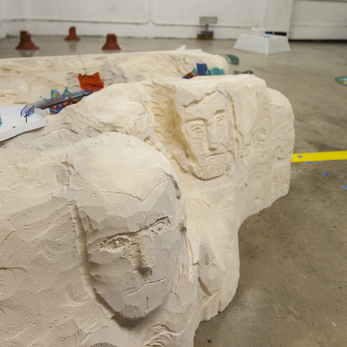
On Tuesday, April 7, Italian architect, writer, and editor Pier Paolo Tamburelli will present the research that he recently conducted as the Douglas A. Garofalo Fellow at the School of Architecture, University of Illinois Chicago. Tamburelli’s project looks back to Austrian architect Johann Bernhard Fischer von Erlach’s influential book Entwurff einer historischen Architektur (1721) in an attempt to imagine a realistic, collective, and comparative approach to contemporary architecture.
Pier Paolo Tamburelli is an Italian architect, writer, and editor of Milan-based San Rocco magazine. In 2004, together with Paolo Carpi, Silvia Lupi, Vittorio Pizzigoni, Giacomo Summa, and Andrea Zanderigo, he founded baukuh, an architectural collective based in Milan and Genoa. baukuh has won numerous international competitions; produced master plans; built public and mixed-use buildings; restored public buildings; and curated exhibitions. baukuh took part in the Rotterdam Biennale (2007 and 2011); the Istanbul Biennial (2012); the Venice Biennale (2008 and 2012); and was part of the research group for the Dutch National History Museum (2011). Tamburelli has lectured at a number of schools and cultural institutions, including the Architectural Association; Cornell University; EPFL Lausanne; FAU São Paulo, among many others. He studied at the University of Genoa and at the Berlage Institute Rotterdam, and has taught at the PUSA Aleppo (Syria); the Berlage Institute Rotterdam; TUM Munich; and FAUP Porto. He is currently unit professor at the Milan Politecnico.
Image: Pier Paolo Tamburelli, Mount Rushmore; and Monument Valley (background), 2014.
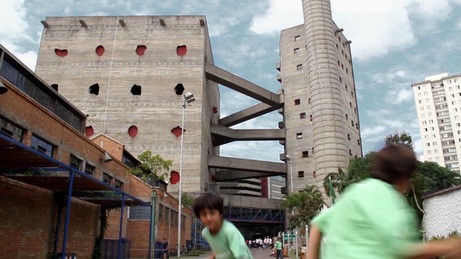
Please join us for a reception to celebrate the opening of our spring exhibition Lina Bo Bardi: Together. Paying tribute to the influential Italian-born Brazilian architect Lina Bo Bardi, this exhibition presents new works by artist Madelon Vriesendorp, filmmaker Tapio Snellman, and photographer Ioana Marinescu that together inspire new conversations around Bo Bardi's work by capturing the experience of her buildings and her inclusive approach to design.
Curated by Noemí Blager and designed by London-based Assemble, Lina Bo Bardi: Together is sponsored by Arper, which has produced Bardi's Bowl Chair (1951) in a limited edition of 500 in collaboration with Instituto Lina Bo e P. M. Bardi in São Paulo on the occasion of the centennial of Bo Bardi's birth.
Friday, April 24
5:30pm: Comments by curator Noemí Blager, Madelon Vriesendorp, and Tapio Snellman
6-8pm: Opening Reception
Noemi Blager is an architect and curator from Buenos Aires, Argentina, who is now based in London. She is former acting director of the Architecture Foundation in London and member of the Design Museum's curatorial committee. Blager is advisor of the Lina Bo Bardi Fellowship, a project initiated by the British Council to create long-term connections between British and Brazilian artists, designers, and architects. In 2003, Blager collaborated with OMA on the exhibition Content, presented in Germany and the Netherlands. She is the culture and development consultant at the Italian design company Arper. She has been a guest lecturer at the Institut für Kunst und Architektur, Vienna; Kingston College, London; and ESADE, Barcelona; as well as tutor of architectural design at the University of Buenos Aires.
Madelon Vriesendorp co-founded the Office for Metropolitan Architecture (OMA) with Rem Koolhaas and Elia and Zoe Zenghelis. Her paintings have been used for numerous book and magazine covers, notably Delirious New York (1978) by Rem Koolhaas. Her work has been exhibited at the Serpentine Gallery (London), Guggenheim Museum and Max Protetch galleries (New York), Centre Pompidou (Paris), Stedelijk Museum (Amsterdam), Aedes Gallery (Berlin), Gallery Ma (Tokyo), Architectural Association (London), and the 2008 Venice Architecture Biennale. Vriesendorp’s work is included in the permanent collections of the Museum of Modern Art, The Canadian Center for Architecture, and Frac Lorraine, France. Since the mid-1980s, she has taught art and design at the Architectural Association, London, and Edinburgh School of Art.
Tapio Snellman is a filmmaker, artist, and architect engaged in architectural and urban discourse. His work includes film installations, commercial moving images, experimental 3D animation, and site-specific projections for museums, theater, and dance. He has had long-term collaborations with creators, such as Herzog & de Meuron, Zaha Hadid, OMA, David Adjaye, and Sasha Waltz on film, animation, and performance projects. Snellman received degrees in Architecture and City Planning from the University of North London and Universität Stuttgart, and currently holds a lecturing position at the University of Innsbruck, Austria. His films and installations have been exhibited at numerous venues, including The Victoria & Albert Museum, Tate Modern, The Hayward Gallery, and The Design Museum, London; the Guggenheim Museum, New York; the Kiasma Museum of Contemporary Art, Helsinki; and at several iterations of the Venice Architecture Biennale.
Ioana Marinescu is a London-based artist working with photography. She studied architecture in Romania and the UK before turning to photography. Her work has been shown at the Architectural Association and RIBA, London; the Cité du patrimoine et de l’architecture, Paris; the Kunsthalle Exnergasse, Vienna; and the Canadian Centre for Architecture, Montreal. Marinescu teaches architecture at Kingston University in London and runs regular workshops and lectures on photography and architecture. Her PhD at the Slade School of Fine Art is concerned with the relationship between cities and memory.
Assemble is a young architecture and design practice based in London. Founded by a collective of 18 members, its work covers a broad range of disciplines, mediums and interests. Through a collaborative working practice Assemble explores design ideas, testing unexpected and imaginative uses of materials and construction. Previous projects range from an experimental theatre space to affordable housing development. Assemble has exhibited internationally, and numerous awards include the Bauwelt international architecture prize (2013) and the New London Architecture Awards (2012). The setting for this exhibition has been designed by Assemble to be a re-enactment of the experience of Lin Bo Bardi’s work.
Arper is a furniture design company based in Treviso, Italy, and is the main sponsor of Lina Bo Bardi: Together.
Instituto Lina Bo e P. M. Bardi in São Paulo, Brazil, is open to the public and holds the archives of Lina Bo Bardi and Pietro Maria Bardi.
Image: Tapio Snellman, SESC Pompeia, still, 2012. Courtesy of the artist.
For more information on the exhibition, Lina Bo Bardi: Together, click here.
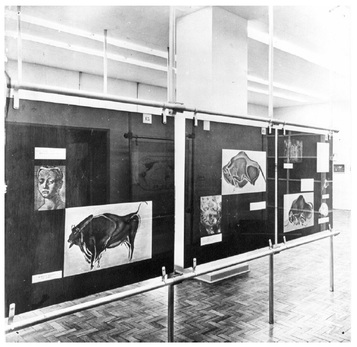
In conjunction with our current exhibition Lina Bo Bardi: Together, Jennifer Scappettone will present her recent research on the collaborative and cross-disciplinary making of the Sao Paulo Museum of Art (MASP) in the 1940s-60s. Scappettone will track the radical efforts of curation by museum director Pietro Maria Bardi, architect and designer Lina Bo Bardi, and the poet Emilio Villa on the inaugural exhibitions for the museum, with an eye to how their supranational reach and montage of prehistoric and modernist aesthetics impacted both contemporary art criticism and the poetry of the neo-avant-garde. MASP’s unique “didactic” exhibitions, which featured objects, photographs, documents, and texts displayed in floating glass easels designed by Lina Bo Bardi, aimed to forge a newly global art history and to educate the New World public without academic pretense—in the interest of enacting what director P. M. Bardi called the “collaboration of all human forces,” generating no less than “the democratic formation of modern man.”
Jennifer Scappettone is a poet, translator, and scholar with particular interests in the reciprocal interference of language, architecture, and public space. She is the author of Killing the Moonlight: Modernism in Venice (Columbia University Press, 2014) and of the poetry collection From Dame Quickly (Litmus, 2009); she edited and translated Locomotrix: Selected Poetry and Prose of Amelia Rosselli (University of Chicago Press, 2012), and curated Belladonna Elders Series 5: Poetry, Landscape, Apocalypse (Belladonna, 2009). Exit 43, a cross-genre work on toxic archaeologies and salvage, is in progress for Atelos Press, with a web-based installation forthcoming in collaboration with Judd Morrissey. She is an associate professor at the University of Chicago.
Image: Installation of the Didactic Expositions at the São Paulo Art Museum (MASP), 1947-8. Vitrine structures by Lina Bo Bardi; content by Emilio Villa, Pietro Maria Bardi, and collaborators. Courtesy Archives of the Library of the São Paulo Art Museum (MASP).
For more information on the exhibition, Lina Bo Bardi: Together, click here.
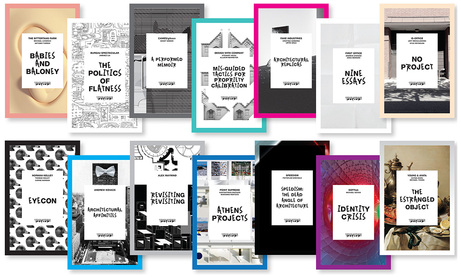
2300 Silver Lake Boulevard
Los Angeles, CA 90039
In collaboration with Archinect and the Neutra VDL House, the Graham Foundation is pleased to present the Los Angeles book launch and party for the Treatise: Why Write Alone? publication series at the Neutra VDL House. Organized by Los Angeles-based designer Jimenez Lai of Bureau Spectacular and the Graham Foundation, Treatise brings together fourteen young design offices working at the forefront of conceptual architecture. This collection of individually-authored treatises follows our recent exhibition at the Graham Foundation in Chicago.
PUBLICATION
Both the complete set and individual volumes (116-pages each; $20) will be available for purchase at the event. Please contact [email protected] for more information about purchasing.
Bittertang, Babies and Baloney
Bureau Spectacular, The Politics of Flatness
CAMESgibson, A Performed Memoir
Design With Company, Mis-guided Tactics for Propriety Calibration
Fake Industries Architectural Agonism, Four Hypotheses on the Use of Agonistic Copies in the Architectural Field
First Office, Nine Essays
Pieterjan Ginckels, SPEEDISM: The Dead Angle of Architecture
is-office, No Project
Andrew Kovacs, Architectural Affinities
Alex Maymind, Revisiting Revisiting
Norman Kelley, Eyecon
Point Supreme, Athens Projects
SOFTlab, Identity Crisis
Michael Young, The Estranged Object
For more information on the exhibition, Treatise: Why Write Alone?, click here.
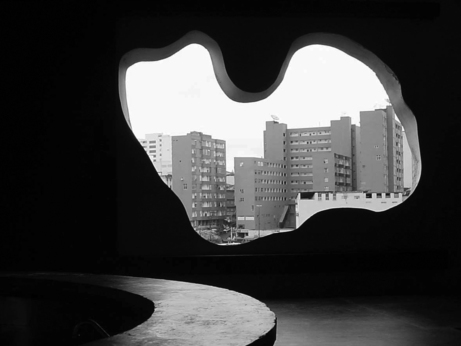
In conjunction with the Graham Foundation's new exhibition, Lina Bo Bardi: Together, Zeuler Lima will present his recent Graham-funded book Lina Bo Bardi about the work and life of the Italian-born Brazilian architect, and will discuss Bo Bardi's prolific career as an architect, editor, theorist, and exhibition designer.
Copies of Lima's Lina Bo Bardi (Yale University Press, 2013) will be available for purchase in the Graham Foundation Bookshop.
Zeuler R. Lima is an architect, author, and associate professor at Washington University in Saint Louis. He received his Ph.D. from the Universidade de São Paulo and completed a post-doctorate fellowship in comparative literature at Columbia University. He unanimously received the International Bruno Zevi Prize for architectural history and criticism in 2007. Lima has published extensively on twentieth-century architecture, urbanism, art, and landscape architecture. He has won several Brazilian design competitions and awards, including the Federal District Legislative Chamber (2010) on the Monumental Axis in Brasília, DF. He also practices drawing, painting, and printmaking and has participated in several exhibitions.
Image: Gregório de Mattos Theater, Salvador, Lina Bo Bardi, 1987. Photo credit: Zeuler R. Lima
For more information on the exhibition, Lina Bo Bardi: Together, click here.
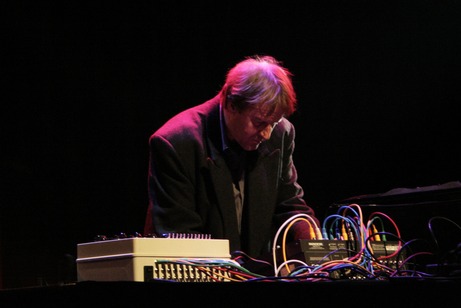
On May 16, Swedish composer and artist CM von Hausswolff will perform a 4-channel solo electronics work using a multi-wave oscillator, microphone for voice, and computer. Recognized for his complex electornic drone compositions, von Hausswolff draws on wide-ranging recording devices, including camera, tape recorder, radar, and sonar, to produce intuitive studies of frequency, distorted electricity, and churning feedback.
Carl Michael von Hausswolff is a Swedish composer and visual artist. Since the late 1970s, his audio work has explored digital and analog recording devices, and his conceptual art practice has combined performance art, light- and sound installations, and photography. von Hausswolff has performed throughout the world, solo and with collaborators, including Russell Haswell, Pan Sonic, the Hafler Trio, Erik Pauser, and John Duncan. In 2012, he received a Prix Ars Electronica award for Digital Musics. His major exhibitions and performances include Documenta (1997, 2012); Johannesburg Biennial (1997); Hayward Gallery (2000); Biennale di Venezia (2001, 2003, 2005, 2007, 2011, and 2015); Portikus (2004); The Land Foundation (2005); The Morning Line, Thyssen-Bornemisza (2010); Stedelijk Museum (2013); and the Institute of Contemporary Art, Philadelphia (2014), among others. von Hausswolff’s first Lampo appearance dates back to February 2001, when he performed Circulating Over Square Oceans. In August 2003 he screened two films for Lampo—Hashima, Japan (2002) and Pan Sonic Plays Kurenniemi (2002). During that 2003 visit, he also began work on a special project for Lampo and WhiteWalls, published as Red Empty (Chicago, 2003) and the audio work There Are No Crows Flying around the Hancock, which he premiered in March 2005.
This performance is presented in partnership with Lampo. Founded in 1997, Lampo is a non-profit organization for experimental music and intermedia projects. Visit www.lampo.org.
PLEASE NOTE: RSVP is required, and event entry is on a first-come, first-serve basis, so please plan to arrive early. Doors will open at 7:30PM.

MAS Context, in collaboration with the Graham Foundation, is pleased to present a screening of the film Josep Lluís Sert: A Nomadic Dream.
The documentary, written and directed by Pablo Bujosa Rodríguez, tells the story of Josep Lluís Sert, a talented architect, city planner, and contemporary of Miró, Calder, and Picasso, and his indelible impact on the course of American architecture. Dean of the Harvard Graduate School of Design from 1953 to 1969, Sert fled Spain during the Civil War and immigrated to the United States where he lived for almost forty years. Sert had a connection to Chicago as he was part of the Graham Foundation Advisory Board when the institution was founded in 1956.
The film features never before seen archival footage as well as interviews with contemporaries of Sert including Rafael Moneo (architect), Robert Campbell (architect, journalist, 1996 Pulitzer Prize winner, and former colleague of Sert), Robert Gardner (filmmaker, former Director of the Carpenter Center for Visual Arts at Harvard University, and personal friend of Sert), and Gerald & Nina Holton (personal friends of Sert and current owners of the Sert home in Cambridge).
Josep Lluis Sert / A Nomadic Dream
www.jlsertfilm.com

On May 27, the Graham Foundation will announce its 2015 Grants to Individuals with a public presentation and reception at 6pm CDT at the historic Madlener House in Chicago. During this special program, which will be broadcast online via live streaming, we will announce over $490,000 in grants to individuals around the world to support new and challenging ideas in architecture. The event will also include presentations by a selection of our new grantees about their Graham-supported work in progress.
Join us in Chicago or via Live Streaming!
6pm CDT Awards Announcement
7-8pm CDT Reception
Watch the program on YouTube Live by clicking here.
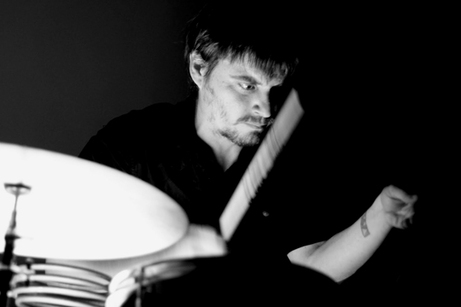
Australian drummer and percussionist Will Guthrie will present his powerful solo percussion work in a rare U.S. appearance at the Graham Foundation on Saturday, June 13.
Will Guthrie is an Australian drummer and percussionist living in France. He works in many different settings of music: live performance, improvisation, and studio composition, using various combinations of drums, percussion, objects, junk, amplification, and electronics. In addition to his solo work, Guthrie plays in The Ames Room (with Jean-Luc Guionnet and Clayton Thomas), Elwood & Guthrie (with Scott Stroud), and Thymolphthalein (with Anthony Pateras, Natasha Anderson, Clayton Thomas and Jérôme Noetinger). He also runs Antboy Music—the experimental improvised CD label—and is part of the collective CABLE#. Regular collaborators past and present include Jean-Philippe Gross, Julien Ottavi, Jérôme Noetinger, Jean-Luc Guionnet, Keith Rowe, David Maranha, and Anthony Pateras.
This performance is presented in partnership with Lampo. Founded in 1997, Lampo is a non-profit organization for experimental music and intermedia projects. Visit www.lampo.org.
Please Note: RSVP is required, and event entry is on a first-come, first-serve basis, so please plan to arrive early. Doors will open at 7:30PM.
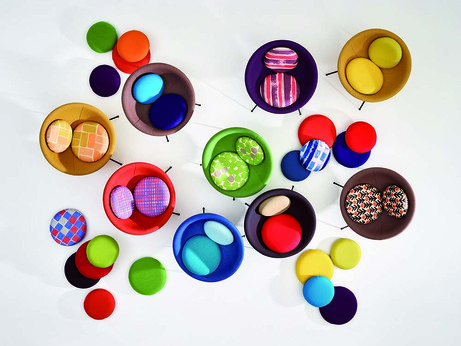
In conjunction with our current exhibition Lina Bo Bardi: Together, the Graham Foundation, with Arper, is pleased to host the U.S. launch of the Bardi’s Bowl Chair. Join us on Monday, June 15, for a reception featuring opening remarks by Susan Szenasy, Editor-in-Chief of Metropolis, and Claudio Feltrin, CEO of Arper.
Originally designed by Lina Bo Bardi in 1951, Bardi’s Bowl Chair has been produced by Arper, in partnership with the Instituto Lina Bo e P. M. Bardi in Sao Paulo, in a limited edition of 500.
Photo by: Marco Covi.
Bardi's Bowl Chair
http://bardisbowlchair.arper.com/
Arper
http://www.arper.com/en
For more information on the exhibition, Lina Bo Bardi: Together, click here.
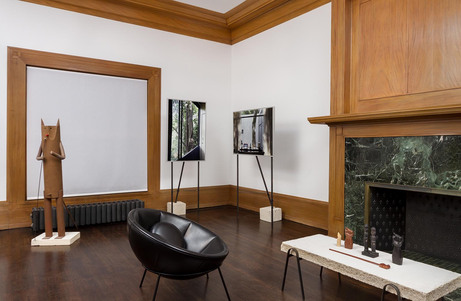
View of "Lina Bo Bardi: Together", 2015, Graham Foundation, Chicago. Photo by: RCH | EKH.
As part of Chicago Design Week, Ellen Alderman, Managing Director of Public Programs will give a tour of the exhibition Lina Bo Bardi: Together, which presents the extraordinary work and legacy of the Italian-born Brazilian architect, furniture and set designer, curator, illustrator, and editor Lina Bo Bardi.
Featuring new works by artist Madelon Vriesendorp, filmmaker Tapio Snellman, and photographer Ioana Marinescu, this exhibition endeavors to inspire new conversations around Lina Bo Bardi’s work. It brings to life the experience of Bo Bardi’s buildings and her inclusive approach to design, which aimed to dispel aesthetic and social hierarchies and embraced the texture and diversity of her adopted Brazil. Additionally, the exhibition includes three of Arper’s recent limited edition of Bo Bardi’s Bowl Chair, which was originally designed in 1951, but never manufactured until now.
The event is free and open to the public.
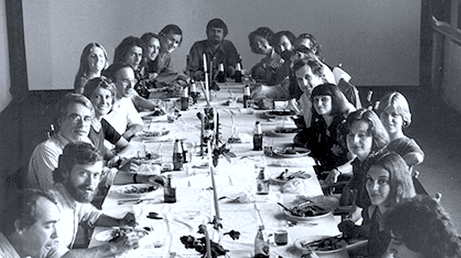
Diana Agrest's documentary film traces the critical undertakings of the Institute for Architecture and Urban Studies (IAUS). Founded in NYC in 1967 as an alternative forum for architectural research, education, and practice, the IAUS was a place of immense energy and effervescence, whose young founders and participants, while hardly known at the time, would shape architectural practice and theory for decades. They included figures such as Peter Eisenman, Kenneth Frampton, Frank Gehry, Aldo Rossi, Deborah Berke, Rafael Moneo, as well as Agrest herself. Featuring remarkable archival footage and interviews with the IAUS's original participants, this Graham-funded film provides an intimate look back at the creation of the IAUS and its enduring significance as a locus for the architectural avant-garde.
Diana Agrest, FAIA was a Fellow of the Institute for Architecture and Urban Studies in New York City from 1972-1984 and is the writer, producer, and director of The Making of an Avant-Garde, The Institute for Architecture and Urban Studies 1967-1984. Agrest is an internationally renowned architect known for her unique and pioneering approach to architecture and urbanism. She is founder and partner of Agrest and Gandelsonas Architects and has designed and built a range of award-winning projects including urban master plans, institutional buildings, residences, and interiors. Agrest is a full-time Professor at The Irwin S. Chanin School of Architecture of The Cooper Union and has previously taught at Princeton, Columbia, and Yale universities. Her published books include Architecture from Without: Theoretical Framings for a Critical Practice (MIT Press, 1991); Agrest and Gandelsonas Works (Princeton Architectural Press, 1995); The Sex of Architecture (eds. Agrest, Conway, and Weisman; Abrams, 1996). She created and directed Framing the City: Film, Video, Urban Architecture at The Whitney Museum of American Art in 1993 and has produced over fifty short films at the Cooper Union, Columbia University, and University of Buenos Aires.
Related Grant: 2010 Individual Grant to Diana Agrest for “The Making of an Avant-Garde: The Institute for Architecture and Urban Studies, 1967-84"
Image: IAUS Fellows and other members summer dinner. Film still from The Making of an Avant Garde, 2012.
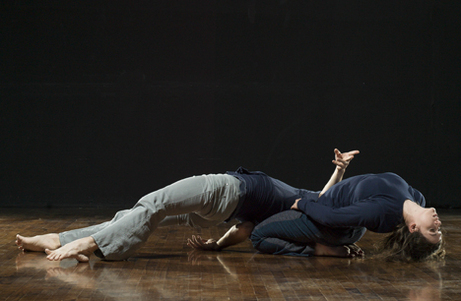
Khecari Dance Company is a Chicago-based contemporary dance company whose original, movement-based works are notable for their power, idiosyncrasy, and resonance. On August 21, Khecari Dance Company will present their newest work-in-progress—Orders from the Horse—an immersive, site-specific dance performance that will activate multiple rooms in the Graham Foundation’s turn-of-the-century Madlener House. Crafting different environments to frame various perceptual states, dancers will negotiate a landscape pocked with dips, rises, and eddies; falling in, through, or past each other’s wake as they move. Orders From The Horse will be performed by artistic directors Julia Antonick and Jonathon Meyer, with Lighting Design by Rachel K. Levy, and percussion by Joe St. Charles.
Julia Antonick, Khecari’s co-artistic director since 2010, is a dancer and choreographer whose work emphasizes kinetics, filigree, and partnering work. Since 2007, she has been immersed in an ongoing collaboration with her partner Jonathan Meyer, an ongoing investigation of duet-based movement forms. Antonick graduated from the Chicago Academy for the Arts with the Dance Department’s Award of Excellence, and received her BFA in dance from CalArts. She has received choreographic residencies at Djerassi, Ragdale, Links Hall (LinkUp), the Chicago Cultural Center (DanceBridge), and the Storefront Theater. She has received grants from the Chicago Department of Cultural Affairs, Illinois Arts Council, Richard H. Driehaus Foundation, Chicago Seminar on Dance and Performance, The Weasel Fund, Community Arts Assistance Program, and was awarded the Chicago Dancemakers Forum Lab Artist Grant for 2009/2010.
Jonathan Meyer is Co-Artistic Director of Khecari. A gymnast in high school, Meyer discovered dance at Oberlin College in 1990. After a capoeira immersion in Brazil with Maestre Medicina, he returned to college to receive an undergraduate degree in dance from the University of North Carolina at Greensboro. Jonathan has spent time in Montreal, Utah, Amsterdam, and New York, alternating between the dance world and work with at-risk youth in wilderness therapy programs. In 2002, he founded Khecari in Taos, New Mexico, before relocating to Chicago in 2006. Shortly thereafter he began an intensive collaboration and partnership with Julia Rae Antonick, with whom he currently runs the company. Meyer has been a Chicago Dancemakers Forum Lab Artist, an artist in residence at Djerassi and Ragdale Foundations and through LinkUp and DanceBridge in Chicago, and has received support from the Illinois Arts Council and the Chicago Department of Cultural Affairs and Special Events.
Rachel K. Levy is lighting designer for Khecari. Levy’s work has been seen on actors, dancers, musicians, and other performers throughout the US. Highlights include: Piedra de Sol (Getty Villa, Los Angeles, CA); LA Grand Ensemble (Los Angles, CA); Vitality (Dance Alliance, Los Angeles, CA); Beware (Bootleg Theatre, Los Angeles, CA); Patty: The Revival (Highway Theatre, Santa Monica, CA); Antiman, Where’s My Money (Michele Lonsdale Smith Productions, Los Angeles, CA); and Unroute (Michaelopolous Studio, New Orleans, LA). Additionally, Rachel has received two Primetime Emmy Award Certificates for Best Lighting for a Variety, Music, or Comedy Show (So You Think You Can Dance 2011, 2012), and holds an MFA in Production and Design from California Institute of the Arts and a BFA in Dance from Tulane University.
Joe St. Charles is a percussion composer, performer, improviser and teacher who has been working in Chicago since 2001. He has performed at various galleries, music venues, festivals, and institutions throughout the city including The Chicago Cultural Center, Links Hall, Pritzker Pavilion, Curtiss Hall, The Museum of Contemporary Art and the Ruth Page Center for Dance as well as commissioned performances at The University of Chicago and The Dance Center at Columbia College Chicago. Joe also releases percussion recordings under the name Owleater, and teaches students both young and old on Chicago’s north side.
Image credit: William Frederking
Khecari Dance Company
http://www.khecari.org/
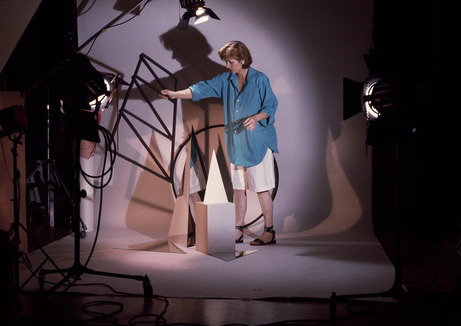
Please join us for a reception to celebrate the opening of our fall exhibition, Barbara Kasten: Stages, with comments by Barbara Kasten and ICA curator Alex Klein.
In conjunction with the exhibition opening, the Graham Foundation, with Distributed Art Publishers, is pleased to launch Barbara Kasten: The Diazotypes––a special small-run artist book of Kasten's diazotypes, a body of work she created while living in California in the 1970s, using a process commonly employed to create architectural blueprints. Along with the exhibition catalogue, Barbara Kasten: The Diazotypes will be available for purchase at the Graham Foundation Bookshop.
Barbara Kasten: Stages is organized by the Institute of Contemporary Art, University of Pennsylvania and is curated by ICA Curator Alex Klein. This exhibition is presented in partnership with the 2015 Chicago Architecture Biennial.
Major support for Barbara Kasten: Stages has been provided by The Pew Center for Arts & Heritage, with additional support from the Nancy E. and Leonard M. Amoroso Exhibition Fund, Pamela Toub Berkman & David J. Berkman, Bortolami, the Carol T. & John G. Finley Fund, Kadel Willborn Gallery, the Marjorie E. and Michael J. Levine Fund, Toby Devan Lewis, Amanda & Andrew Megibow, Stephanie B. & David E. Simon, Babette L. & Harvey A. Snyder, and Meredith L. & Bryan S.Verona.
Please note that the opening reception for Barbara Kasten: Stages is being filmed for a documentary produced by the nonprofit contemporary art organization ART21, which creates educational films for public television and the Web. By entering the exhibition space on October 1, you may be included in some of the shots filmed for this documentary, and consent to be so included. Should you have any questions, please direct them to Graham Foundation staff Mia Khimm ([email protected]) or Meg Onli ([email protected]), who will be present during filming. Thank you for your understanding.
Image: Photo-documentation of Barbara Kasten working in her studio, New York, NY, 1983. Photo by Kurt Kilgus. Courtesy of the artist.
For more information on the exhibition, Barbara Kasten: Stages, click here.
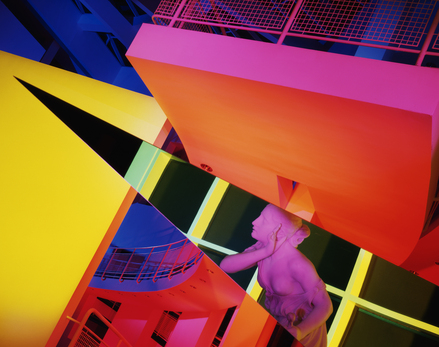
**Please note: The talk will take place at the International Museum of Surgical Science, 1524 N Lake Shore Drive. Doors open at 5:30pm and seating is first come, first serve. Following the talk, join us for a reception in the Graham Foundation galleries, where the exhibition "Barbara Kasten: Stages" is on view.**
In conjunction with our new exhibition Barbara Kasten: Stages, art historian and critic Alex Kitnick will explore the critical stakes of Barbara Kasten’s photographic series from the 1980s that artfully staged important works of American architecture, including Arata Isozaki’s Museum of Contemporary Art, Los Angeles and Richard Meier’s High Museum of Art in Atlanta. Created at the height of postmodern theory, Kasten's Architectural Sites submits iconic buildings to distorting angles and colored lights, thus transforming already vertiginous structures into truly illusory spaces. Kitnick argues that these photographs offer a unique form of criticism that seek to heighten—rather than deconstruct—the effects of an emerging Postmodernism, and that these effects that are increasingly familiar today.
Alex Kitnick teaches at Bard College, where he was recently appointed the Brant Family Fellow in Contemporary Arts. In 2010 he received his PhD from the Department of Art & Archaeology at Princeton University. From 2011 to 2012 he held a postdoctoral fellowship at the Getty Research Institute in Los Angeles. Kitnick's work frequently focuses on the intersection of art and architecture. He has edited numerous volumes including a collection of John McHale’s writings, The Expendable Reader: Articles on Art, Architecture, Design, and Media, 1951-1979, which was supported by a grant from the Graham Foundation, and October 136 on New Brutalism. He is a frequent contributor to Artforum, October, and Texte zur Kunst, among other publications.
Image: Barbara Kasten, "Architectural Site 17, August 29, 1988", 1988. Cibachrome. 60 X 50 inches. Location: High Musem of Art, Atlanta, GA. Architect: Richard Meier. Courtesy of the artist.
For more information on the exhibition, Barbara Kasten: Stages, click here.
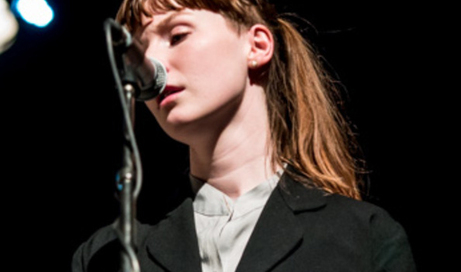
In a performance at the Madlener House on November 21, Norwegian artist and composer Stine Janvin Motland, will present her solo project In Labour. Motland’s piece challenges the concert format, raising questions about how we listen within and without the designated performance space. Using an omnidirectional, wireless microphone, the remarkable vocalist will move between the main performance space of the Madlener House ballroom and the adjacent rooms, transmitting her vocal abstractions and the surrounding ambience live to the audience. In addition, Motland will perform a solo improvisation during the event.
Please note: Due to the installation of artwork for our current exhibition, seating for this performance is extremely limited. RSVP is required and event entry is first-come, first-serve, so please plan to arrive early. Doors will open at 7:30pm.
Stine Janvin Motland is a vocalist, improviser, and composer based in Stavanger, Oslo and Berlin. Using highly original, extended vocal techniques and elements of physical theater, she pushes the natural acoustics of the human voice and thus, the definition of the singer, to explore its limits and its implications. Motland’s ongoing projects include her solo piece In Labour; Native Instrument with Felicity Mangan; and the Brigitte & Paula band with Maria Ramvi and Camilla Vislie. She also works with artists such as Lasse Marhaug, Maja Ratkje, Fred Lonberg-Holm, and Mats Gustafsson in a number of interdisciplinary projects. Selected recent performances include the Unsound Festival, Krakow; Performa 13, New York; Music Unlimited, Wels; Ultima Oslo Contemporary Music Festival, Oslo; Festival CRAK, Paris; International Theater Festival MESS, Sarajevo; Pérez Art Museum, Miami; Festival Densités, Fresnes-en-Woëvre; Jazz á Luz, Luz-Saint-Sauveur; Nya Perspektiv, Västerås; and All Ears Festival, Oslo.
This performance is presented in partnership with Lampo, with support provided by the American-Scandinavian Foundation. Founded in 1997, Lampo is a non-profit organization for experimental music and intermedia projects. Visit www.lampo.org.
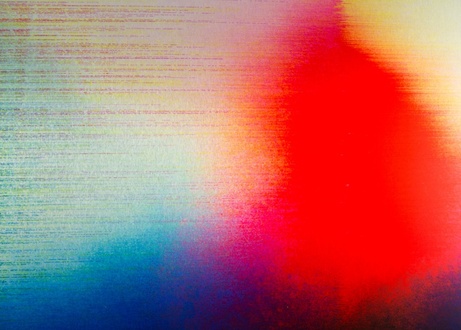
*This performance will take place at Rebuild Foundation at the Stony Island Arts Bank, 6760 S. Stony Island Ave, Chicago (map).*
In his Chicago debut, artist and Graham grantee James Hoff will present a new four-channel work using computer viruses to infect beats, where the mutated results become the building blocks for new compositions.
His interest in computer viruses lies in their ability to self-distribute through (and ultimately disrupt) networks of communication, and Hoff’s agency as an artist centers on placing these parasitic forms into pre-existing genres, such as dance music.
“Viruses, like art, need a host. Preferably a popular one,” he writes.
James Hoff is an artist living and working in Brooklyn, NY. His work encompasses painting, sound, writing, performance and publishing, among other media. Taking cues and inspiration from the computer works of Emmett Williams, BP Nichol and Jackson Mac Low; conceptual writers Vito Acconci, Aram Saroyan and Douglas Huebler; and early to late computer viruses (from Pervade to Flame), Hoff works with malware to infect media files as a compositional strategy for painting and music.
Hoff is also a co-founder of Primary Information, a nonprofit arts organization devoted to publishing artists’ books and art historical documents. Primary Information is the recipient of three Graham Foundation grants, most recently in 2015 for “Dan Graham and the Static,” a limited-edition cassette featuring the unique recording of a seminal artwork by Dan Graham that connects architecture, performance, and music.
This performance is presented in partnership with Lampo and Rebuild Foundation. Founded in 1997, Lampo is a non-profit organization for experimental music and intermedia projects. Rebuild Foundation is a nonprofit organization that endeavors to rebuild the cultural foundations of underinvested neighborhoods and incite movements of community revitalization that are culture based, artist led, and neighborhood driven.
Related Talk: On Saturday, December 12, at 2:30pm James Hoff will discuss the history of artists’ books and Primary Information, the organization he co-founded to publish books and writings by artists. He will have a small selection of his artists’ books on hand to share with the audience. This talk will take place at Rebuild Foundation at the Stony Island Arts Bank. For more information, click here.
Related Grants: 2015 Organizational Grant to Primary Information for “Dan Graham and the Static” (2016); 2014 Organizational Grant to Primary Information for “Fantastic Architecture” (2015); and 2013 Organizational Grant to Primary Information for “The Sound Works of Vito Acconci” (2016).
Image: James Hoff, Skywiper No. 3 (detail), 2014. Chromaluxe transfer on aluminum, 30 x 16 inches. Courtesy of the artist and Callicoon Fine Arts, New York.
Unless otherwise noted,
all events take place at:
Madlener House4 West Burton Place, Chicago
Gallery and Bookshop Hours:
Wednesday–Saturday, 12–5 p.m.
Thanksgiving Holiday Hours:
The galleries and bookshop will be closed Wednesday, Nov. 27 to Friday, Nov. 29.
Regular hours resume Saturday, Nov. 30, open 12–5 p.m.
CONTACT
312.787.4071
[email protected]
Accessibility
Events are held in the ballroom on the third floor which is only accessible by stairs.The first floor of the Madlener House is accessible via an outdoor lift. Please call 312.787.4071 to make arrangements.
Copyright © 2008–2024 Graham Foundation. All rights reserved.